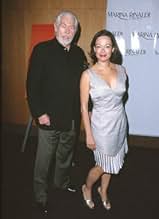While in exile in Italy, an African woman finds herself trying to get back home and free her imprisoned husband. But the only man that can help her do so is in love with her.While in exile in Italy, an African woman finds herself trying to get back home and free her imprisoned husband. But the only man that can help her do so is in love with her.While in exile in Italy, an African woman finds herself trying to get back home and free her imprisoned husband. But the only man that can help her do so is in love with her.
- Director
- Writers
- Stars
- Awards
- 4 wins & 13 nominations total
- Shandurai
- (as Thandie Newton)
- Piano Buyer
- (as Gianfranco Mazzoni)
- Director
- Writers
- All cast & crew
- Production, box office & more at IMDbPro
Featured reviews
This film "L'assedio" (The Siege) is more visually expressed vs. through articulating dialog. We are presented with scenes, imageries, expressions, wide or high angle shots through perceptive conscious editing. I especially noted the repeats of the beautiful shadow pattern of the spiral railing leafy design -- 'besieged' in a rather elegant environment (perhaps evident to the audience more than to the central character herself). The besiegement is not exactly physical, it is more of the internal emotional dilemma and struggles our heroine feels. We are shown the various artistic collections and beauty of things around the house as we follow her housekeeping routines. She could very well be too wrapped up in her own world (pursuing her medical studies, preparing for exams, and her flashbacks/dreams of homeland events in Africa) and opened herself not to the other person or what's really around her.
The opening sequence is actually a critical flashback for our heroine Shandurai, portrayed by Thandie Newton (w-d John Duigan's "Flirting" 1989; Jonathan Demme's "Beloved" 1998 with Oprah Winfrey). David Thewlis (w-d Mike Leigh's "Naked" 1993; Jean-Jacque Annaud's "Seven Years in Tibet" 1997 as Brad Pitt's adventurous companion) is Mr. Kinsky, the other part of the quotient in this fable like story that Bertolucci interweaved. Shandurai was from Africa and is now a medical student in Rome, staying at Mr. Kinsky's house where she does daily housekeeping chores in exchange for her own room and board.
There is also a "beseeching" undertone to this tale. He (Mr. Kinsky) the solitary composer/pianist in want of her love. She (Shadurai) the solitary soul 'exiled' from home (Africa) in want of the freedom of her loved one. Trust -- a human dilemma? How do you trust a stranger? Does the person really listen to you? Does s/he hear what you're saying?
Trust in another person, a total stranger, is not easy to come by. Society has made it a norm that you have to earn it -- trust. If you say something or make a request, you don't really expect it to come true. That the other person actually listened and took it to heart and do something about it to make a wish happen is only in dreams! Well, whole-hearted loving is possible and we should not take things for granted.
There are no extraneous frames here. Visual and sound (the music, the piano pieces) are both purposefully fulfilling in unraveling the story. Thewlis delivered a superb subtle performance. Newton followed up her "Beloved" role with equal concentration. Bertolucci weaved his magic once again. What a statement -- what a story he has given us! A beautiful film. A fable, indeed.
The wonderful photography (cinematography by Fabio Cianchetti), especially the use of cast shadows reminded me of the silent B/W German classics by Robert Wiene, "The Cabinet of Dr. Caligari" 1919, in which shadows were used thematically in repeated graphic forms -- very effective filmmaking.
I was completely enthralled at the way this movie unraveled itself, layer by delicate layer, with little dialogue but with a kaleidoscope of imagery and most of all, with music. Bertolucci is frequently obssessed with his heroine's beauty, and this is no exception. The camera frequently lingers on the gentle curve of Newton's arm, the slope of her back, and on her great dark eyes. However, Bertolucci has for once given us a compelling female character, a woman of determination as well as beauty, unlike his usual bevy of vacuous/self destructive mannequins (e.g. Liv Tyler in "Stealing Beauty", Dominique Sanda in "1900", etc). Shandurai's new-world vigor and her sense of purpose contrast starkly with Kinsky's aimlessness, his solitude, and especially his music, which permeates the movie with exquisite melancholy (the music consists mainly of solo piano pieces by Bach, Chopin, Scrabin and Coltrane). Likewise, the effect of their relationship on Kinsky is expressed most effectively through the transformation in his music, as primitive beats of Africa are blended into the lyricism of Kinsky's composition.
The movie is short, sparse and as different as night and day from the usually action-driven fares of Hollywood. Bertolucci, in a rare form, has fashioned a truly adult film that deftly navigates through the complexities of the human heart.
Did you know
- TriviaThis was originally meant to be a 60 minute TV play until Bernardo Bertolucci decided to expand it.
- Quotes
Jason Kinsky: [after he gave her a wedding ring that used to belong to his deceased aunt] I love you. Marry me.
Shandurai: Let me go!
Jason Kinsky: Please love me. I'd do anything. What do I have to do to make you love me?
Shandurai: You get my husband out of jail!
- ConnectionsEdited into Gli ultimi giorni dell'umanità (2022)
- How long is Besieged?Powered by Alexa
Details
Box office
- Gross US & Canada
- $2,048,740
- Opening weekend US & Canada
- $159,289
- May 23, 1999
- Gross worldwide
- $2,048,740
- Runtime
- 1h 33m(93 min)
- Sound mix
- Aspect ratio
- 1.66 : 1















